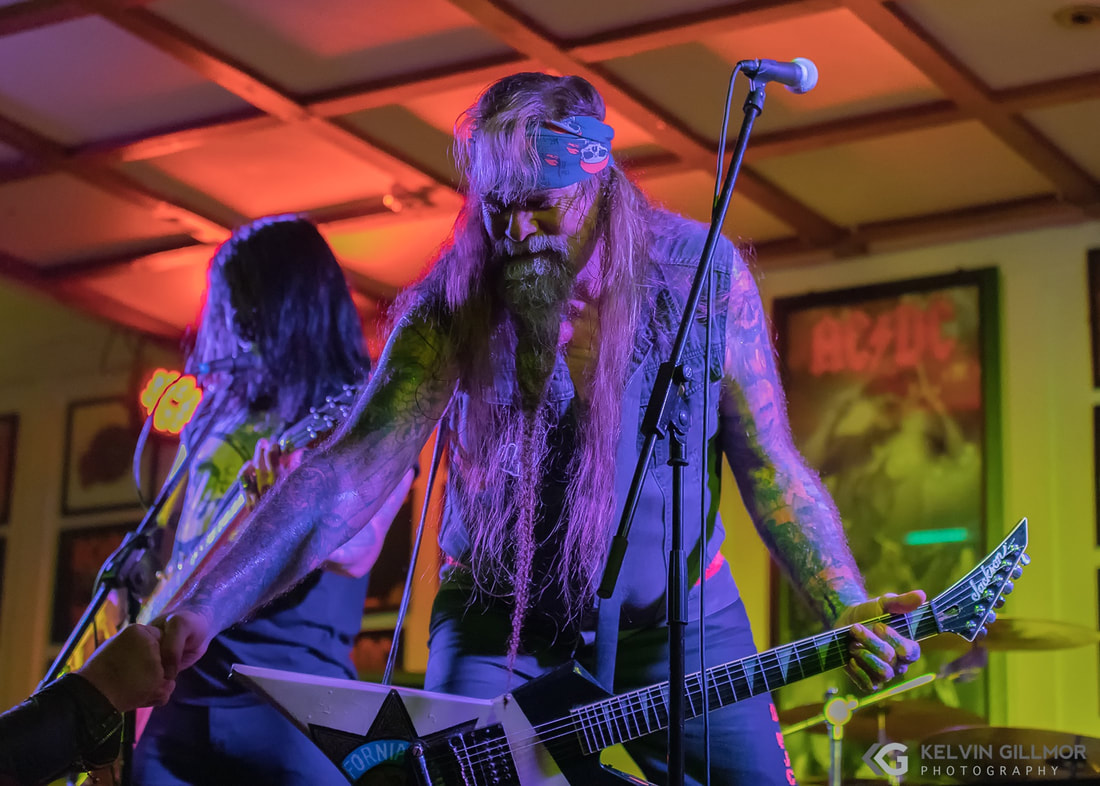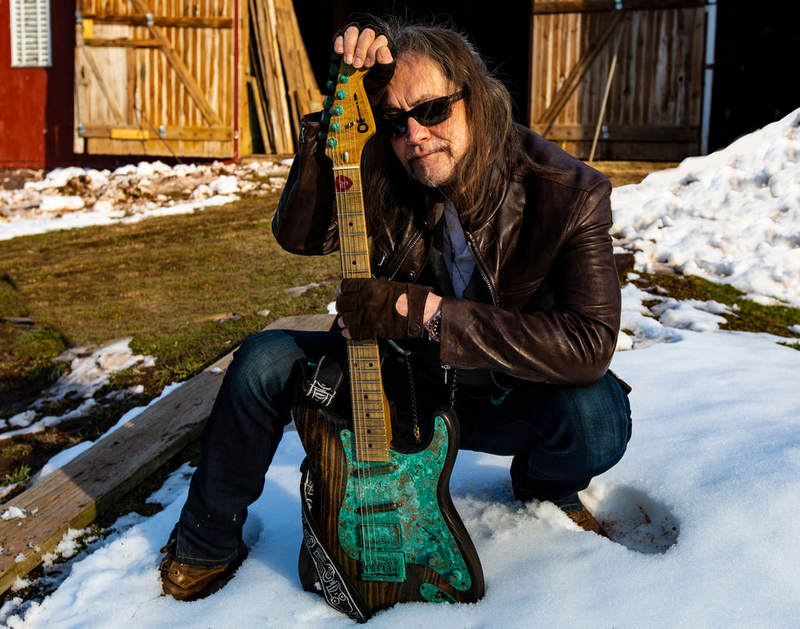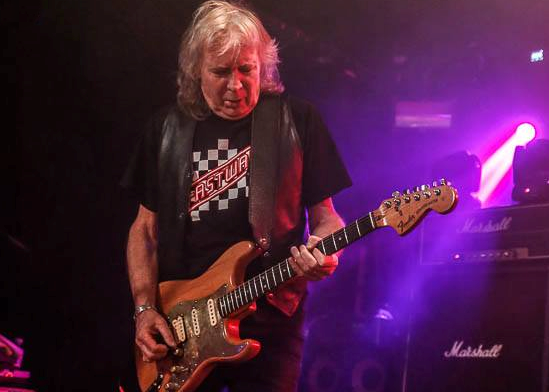|
Dispelling his reputation as the “unruly one", blonde bomber Chris Holmes comes across as a genuinely warm and down to earth individual when you meet him. A key member of W.A.S.P. from their formation until their late 80s’ heyday, the guitarist is back tearing up the live circuit with his inimitable presence and fluid fretwork. Now about to release new EP ‘Under The Influence’, we caught up with Chris for a chat his time with the shock rockers, guitar techniques, and the divisions that drove W.A.S.P. apart. Inside the electric circus; Eamon O’Neill.
Hi Chris, you’re back in Ireland for a short tour; what memories do you have of playing here in the past?
On ‘Inside The Electric Circus’, I think we were in Belfast. It was the first night of the tour, and Blackie [Lawless] used to have this thing on his dick; I’m not into that stuff – I dress to be on stage, but I’m not [like that]. He had what they call a gerb [a type of firework which produces a jet of sparks] on a codpiece, and he said at rehearsal, at the end of the show he’s going to hold his guitar up [and let the gerb off], and I started laughing and I walked off stage, and the roadie said; “It’s Blackie Ball-less and we’re going home!” He held his guitar up and you light the match and you hit the button and it’s supposed to start the gerb. Well, he did that, and I was off to the side of the stage, and it went BOOM! And he fell down on stage, and I thought it blew his balls off. That was the first night of the tour. It was funny as hell! What can yell us about your new solo band ‘Mean Man’? I just play rock music. I don’t sample – I’m never going to sample, because that’s fake. We tried to pick up a singer / rhythm guitar player that can sing Blackie’s W.A.S.P. stuff, because I can’t. If I sing it, I’ll get crucified. I sing my stuff and the cover songs that we choose to do. We do two Black Sabbath cover songs and I sing those, and ‘Rockin’ In The Free World’ by Neil Young. I can sing those without getting crushed, but if I was to do a W.A.S.P. song, it would be like if Blackie tried to do the solos that I did in W.A.S.P. I will say that the guy’s voice is unique like no other person’s voice. Musically, those early W.A.S.P. albums had some real magic on them. There was a magic between him and I, creating and writing the songs. He can sit there and say he wrote them all, I don’t really care, [but] there’s living proof on the internet. There’s ‘Love Machine’, on a band called Circus Circus, which him and Randy [Piper, original W.A.S.P. guitarist] were playing. I joined W.A.S.P. six months later, Randy gets thrown out, and I changed the song to the way I wanted to play it. I just said; “That song sucks – I’m not going to play it that way”, and I switched it around. A lot of the stuff that we played, I don’t like anybody telling me; “Play B minor, or play this chord or that chord”, I’ll play a B, or an E or whatever at the time it is, but I’ll play it my way, not your way. The pinnacle of your time in W.A.S.P. was arguably ‘The Headless Children’ era; what are your memories from working with Frankie Banali and Uriah Heep's Ken Hensley on that album?
Ken was an icon at the time, and a real great person. He looked at me not [any worse than, or] no better than him, straight. I loved that. A lot of other musicians don’t. Frankie Banali always treated me like a roadie because I roadied for a band when I was 16 that he played drums for. His guitar player was a guy that gave me Blackie’s number to join Sister when I was 17, so he always treated me like a roadie. In terms of your performance on the album, the extended soloing section in ‘Thunderhead’ was incredible; did you write those ahead of recording? I was supposed to sit down and write all the solos out, but I’m not into that. The way I learned to play guitar was first ‘Smoke on the Water’ on two strings, then I learned to play a 1, 4, 5 blues progression; ‘Johnny B. Goode’, and then play lead guitar to it. So, you learn how to jam, and that’s how I learned to play lead guitar. But Blackie always wanted stuff structured. I had to show him, and I told him I worked on the solos, but I never did. I went in and I just played what I felt. That solo is an incredible piece of work. There was double tracked stuff [*sings the riff at 5.04*]; that’s the idea, you get the first riff, and then you get the next one to overlap. That just came out. That was all written right there in the studio. One of your signature licks was the fast-paced hammer-on with the side of the pick, as in ‘Sleeping In The Fire’. I did that because at the end of the first Black Sabbath song on the forth album that they had [‘Wheels of Confusion’], or maybe ‘Into The Void’, at the end of the solo, Iommi is just smoking these trills. They’re so fast, and the only way that I could figure to trill that fast was to do that. I love that, but I couldn’t use my [left] hand like that. I did it on ‘Sleeping in the Fire’, and another song ‘Sex Drive’. It’s easy; it’s easier to do that than doing a trill. There seems to be some uncertainty about how you came to part ways with W.A.S.P. after that period. There was some really bad conflicts on the road, and I was lied to, and I almost left on the road, because it’s not about the money to me. I got lied to from somebody, so I was going to leave in the tour, but the tour manager Dickie Bell – who does Iron Maiden, he was doing W.A.S.P. at the time because Maiden wasn’t out – he said; “Chris, if you leave now, you’ll get sued for all the money”. He goes; “You’ll be working at McDonalds in ten years still trying to pay off the debt to Sanctuary [management]”. So I go; “What’ll I do?” And he goes; “Finish the tour, and leave then”. So I finished the whole tour, and once I was done, I was gone. I didn’t want to play anymore. I didn’t really care what Blackie did after that. When you live with people, you want to be treated as equal; that’s it. I don’t want to be treated any less, or any more, and when they treat you down, I don’t like being around people like that. You followed W.A.S.P. with your own band Psycho Squad.
That was a good band. I loved it because every song was written about real things in life. I wrote ‘Born, Work, Die’ in ’91, and for some reason W.A.S.P. had an album called ‘Kill. Fuck. Die.’. I had a song called ‘Let it Roar’, and then Blackie puts it out first and everyone thinks I’m ripping him off. I don’t really care about that. I don’t rip people off; I’m doing my own thing. But yes, Psycho Squad was a good band, it’s just at that time in history, not too many people were getting signed in hard rock. I couldn’t get a deal. That’s when grunge took over. Rock was dying. In ’87, there were so many god-damn groups in L.A., all dime-a-dozen, they all sounded the same. It was just over-flooded, the market, and it’s time for new things. Grunge came in, and kind of just took over the whole situation. How did you come to re-join W.A.S.P. in 1997? I had quit playing. I was just living in Wyoming. The lying and all the crap, and just the management and this and that, about money; I quit. I had Psycho Squad, and it had problems, and then I had a chance to go live in Wyoming on my sister’s ranch, and I went out there, and I was going to live there the rest of my life. It was great. One of the roadies called me and asked me if I wanted to come back and play, and I called up Blackie, and he wanted to know if I’d tour again. I was happy living there in Cody, Wyoming; you can grow old there, it’s not like the fast lane, smog, people, dope, alcohol, drugs, hatred; my sister was right by Yellowstone, and it’s beautiful. It’s a cowboy town, and it’s a beautiful place and I love it, but I thought about it, and I thought, you know what, I’d never see a tour [again], and I’d never leave there, so I thought; “I’d like to see Europe again, and see a few things and travel”, so I called him back and said; “Yeah, I’ll come back and play”. The first album on your return was the harder-edged ‘Kill. Fuck. Die.’ I really didn’t play that much on that. I played, I think, two solos. I had some influence on a song or two writing lyrics. That album was done because somebody – I won’t say his name – was scared of Marilyn Manson taking his spot in rock and roll. It was a really stupid album to do. I hated it. You didn’t like the industrial sound of it? Stet [Howland] didn’t play drums on it, it was a drum machine; it was done on a computer. It’s not rock and roll to me. It bummed me out; I submitted a bunch of stuff for the album that didn’t go on it. I wrote some ideas that just came into the air, and he’d come down and listen to them, and he listened to four one day, and he goes; “Have you got anything else?” And he goes; “Basically, to get one song, you have to write a hundred.” For you, what was the golden era of W.A.S.P.?
The golden line-up would be ‘The Headless Children’. Frankie’s probably one of the best drummers I’ve ever played with. Even though we personally had a few beefs here and there, we’re still friends. The guy’s one of the best rock drummers there’s ever been. He’s played on a lot of famous albums. He’s a monster player, what he plays, and he’s probably one of the most professional guys I’ve ever played with. And bass player Johnny Rod? Johnny Rod’s probably got one of the best ears in the world. Johnny’s an entertainer, Johnny’s crazy. He’s nuts. Back to more recent times, and how did you get back into releasing music and touring again? I did the first one ‘Nothin’ To Lose’ with [former Motörhead drummer] Phil Taylor. It was supposed to be an all instrumental, and I sang on one song as a joke, and Phil goes; “That’s kind of cool”. It's not the best singing, but these new bands have these guys that scream, and because of that, I’m like; “I don’t sound that bad”. And my wife’s given me a lot of confidence on singing. We planned on coming to Finland to work with a band for a while, and I had already done the album with Phil. So the plan was to come to Finland to assemble a band? We spent about seven months in the desert, and I had a Mac so I could record Pro Tools, and I’d written ‘Shitting Bricks’ before I came to Europe, and I had it on the hard drive, so I just pulled the hard drive and we came over here and we had it mixed. And we went to Finland first, and the band there just did what I used to do what I was a kid; drink alcohol and play on stage and be idiots. The guy who ran the band was more into being Joe Rock Star and drinking than taking care of business first and then being a rock star. You’ve got to take care of your business, playing; if you don’t do that, you can’t play rock star. You relocated to Europe permanently around that time. I didn’t want to go back to L.A. The clubs are all closing, hip hop’s taking over real bad. There’s still rock groups there, but for rock groups that are trying to up and come, there’s no place to play anymore. A lot of the main places have closed down. The main premier club in Hollywood closed down and it was bought by Beyonce. So we went and stayed in Cannes, and I play with some French musicians. Finally, you’re currently working on a new album and have a new EP called ‘Under The Influence’ on the way. We just did the EP, and it’s going to be out on 2nd December. In September 2019, we’ll release the album. The last two were done on a computer, but we decided to record in a studio with people; with a real drummer playing drums, a real bass player. Like this interview? Like us on Facebook and follow us on Twitter for regular updates & more of the same. For the latest updates, follow Chris Holmes on Facebook. |
|
Chris Holmes
"I almost left [W.A.S,P.] on the road, but the tour manager said; “Chris, if you leave now, you’ll get sued and you'll be working at McDonalds in ten years still trying to pay off the debt."
© 2016 - 2024 eonmusic.co.ukContact: [email protected]
|




